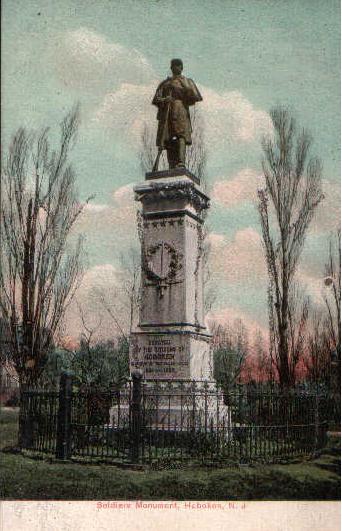 |
 George B. McClellan
George B. McClellan
By Leonard A. Luizzi
Politics, it seems, has always been a passion for many Hobokenites. Many Mile Square Citizens have held, or sought, a variety of public offices. But only one man who lived and worked in Hoboken ever ran for President of the United States.
George Brinton McClellan, the candidate of the Democratic Party in 1864, was born in Philadelphia, Pa, in 1825. The son of a wealthy doctor, McClellan entered West Point in 1842, graduated second in the class of 1846, served with distinction in the war against Mexico, left the Army to become chief engineer for the Illinois Central Railroad, returned to uniform when the Civil War broke out, and rose to command the largest Union force in the Civil War. (Charles S. Stewart, who ranked number one in the class of 1846, never rose higher than the rank of colonel of engineers and reached that level only after the Civil War.) Other classmates included Stonewall Jackson and George Pickett (who stood at the bottom of the class); both would achieve considerable fame as Confederate generals.
McClellan was a clever tactician, and was noticed by President Abraham Lincoln. In 1861, Lincoln appointed McClellan as Commander of the Army of the Potomac, the largest of the Union armies. This was the high point of his military career. McClellan was able to bring organization and order out of chaos in the Union forces in the early days of the war.
In effect, he molded a ragtag assembly of men in uniform into a well-trained and highly disciplined fighting force. And his men adored him for it. But it was his reluctance to use this force to destroy the enemy that prevented him from being remembered as one of the great generals of his time. McClellan’s problem was that, on the battlefield, he was overly cautious. Repeatedly, after victories in West Virginia, at Antietam, and in the Peninsula campaign, he failed to press his advantage and pursue the rebel army. His inevitable assumption was that he was outnumbered. It was his constant pleas for more reinforcements, as well as his inaction, that put him at odds with Lincoln. Finally, McClellan was relieved of his command on November 10, 1862.
In August of 1864, the Democrats choose McClellan to be their presidential candidate and Ohio Representative George H. Pendleton as his vice-presidential running mate. The Republicans renominated Lincoln for a second term, and chose Senator Andrew Johnson of Tennessee as his running mate. With the war going badly for the North, almost everyone, including Lincoln, thought McClellan would win the election. But just as things were at their worst for Lincoln politically, and for the North on the battlefield, suddenly the tide of war turned. General Ulysses S. Grant in Virginia and William T. Sherman in Georgia began to win key land battles, and Admiral David Farragut won the naval Battle of Mobil Bay.
Lincoln went on to win in November, with an electoral count of 212 to McClellan's 21, and a majority of more than 400,000 votes. The only northeastern state McClellan won was New Jersey. After his defeat, McClellan and his family took an extended European vacation.
McClellan’s Hoboken connection actually began in Paris, France. In September of 1867, Edwin A. Stevens, the founder of Stevens Institute of Technology, wrote to McClellan asking him to come to Hoboken to work on the Stevens Battery, an iron clad vessel that had been under construction in one form or another for thirteen years. The reason Stevens wanted a career army man to work on a navy vessel was simple: McClellan was one of the best engineers of his day. Although Stevens died in 1868, he provided money in his will for this project, including an annual salary of $12,000 if McClellan accepted.
McClellan moved his family to Hoboken. The Stevens family arranged for them to live at what was then 108 River Street, between what are now Third and Fourth Streets, on the site where Marine View Plaza now stands. The Battery, as the vessel was called, lay in dry dock at the foot of Fifth Street, later the site of the Holland-American Line and now Sinatra Park. The vessel never was completed and, after eighteen months of work, the money Stevens had left for the project ran out. McClellan moved to New York City, where his son, George B. McClellan, Jr., would later become Mayor of that city. McClellan senior must have been a restless soul, because he was to move back and forth between New York and New Jersey twice.
In 1878, McClellan was elected Governor of New Jersey. He served one two-year term ending in 1881. His tenure was undistinguished; in fact, three months before he left office, he again moved to New York City, making him the only New Jersey governor to live out of the state.
McClellan returned to Hoboken for the last time in 1885. His visit was in response to an invitation from Martha Bayard Stevens to attend a meeting at her home, Castle Stevens, now the site of the Stevens Institute of Technology Student Center. The meeting of prominent citizens was for the purpose of forming the Industrial Education Association of New Jersey. The goal of this group was to train the schoolchildren of Hoboken to work with their hands as well as their minds, and to obtain skills they could use later in life. The results of this meeting, which McClellan chaired, was the Hoboken Industrial School. Unfortunately McClellan did not live to see the it open. Two months after the meeting, on October 29, he died at his home in Orange, New Jersey. He is buried in Trenton’s Riverview Cemetery, overlooking the Delaware River. Among the Civil War veterans attending his funeral was General Joseph E. Johnston, McClellan’s best friend at West Point and later the Confederate commander who opposed McClellan in the Peninsula campaign.

|
|
 |